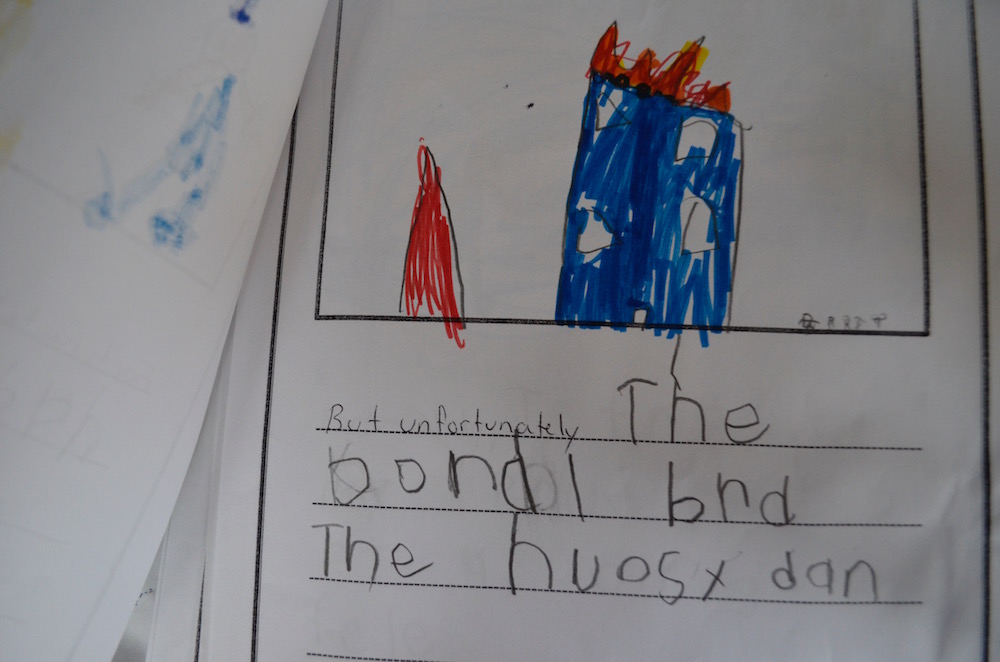I hoist the baby back up on my hip as I pause to stare at the bulletin board. I can pick out my daughter’s work right away. Not only because I recognize her telltale artwork, but because I see the words accompanying it are mostly a simple scramble of letters. I slowly look over the other work, chiding myself for even daring to compare. I, who strive to teach my daughters every day to accept themselves for who they are, am standing here comparing.
She is clearly far behind in writing. I know she’s behind in reading too. She has to be, because we’re in grade two and she’s still struggling to read the first “Mat Sat” book.
Other relevant stories:
• How to Increase Dopamine ADHD
• ADHD and Narcissism
• Good Jobs for People With ADHD
• What is ADHD?
Where does she end and I begin? Why can I tell myself in my head that her immense vocabulary and fantastic comprehension count, yet in my heart her ability to sound out three-letter words is all that matters?
I cry. Again. Most people tell me to wait. It will come, but I am the one who sits with her over and over and sees her struggle, despite a clear and desperate desire to learn. It’s her teacher who will later say, “I’ve never seen a kid work so hard, for so little reward.”
We decide as a family to meet with a psychologist to make sure we aren’t missing something.
I cry on the phone when I book the appointment. I know we’ve chosen the right psychologist when she talks to me for 20 minutes. She listens as my heart cracks open and I admit I’m pretty sure my failure is the reason she can’t read, that I’ve broken her.
Weeks later I sit in the psychologist’s office. “I always hesitate to diagnose kids with this unless I’ve spent a lot of time with them, but I think your daughter has attention-deficit/hyperactivity disorder (ADHD).” She acknowledges this wasn’t even on our radar, but suddenly floods of memories begin pouring in: the daily spilling of cereal, and falling off chairs, the constant clumsy, scatterbrained nature, her teachers telling us she has trouble sitting still and the steady stream of verbal consciousness. Even her reading and spelling is characterized by constantly skittering ahead, talking endlessly about the picture or multiple bathroom breaks.
I spend hours in the next weeks scouring the Internet for anything I can find on ADHD. The stories that hit close to home are about girls — girls who got missed because they don’t present in the typical, running-around-the-classroom stereotype. Stories of busy minds and mouths, of daydreamers and later, lots and lots of shame in teenage girls who felt constantly misunderstood. We find out she scored fairly high on her IQ test, especially in the areas linked to creative problem solving, things associated with girls being highly adept at hiding their struggles.
One night, we try reading with a fidget, as recommended by the psychologist. I don’t chide her for squirming, I remind her to use her finger to follow the words and she twirls the fidget in her other hand. The constant whir of moment making me shudder. She reads the whole book, in order. I choke back tears. Could it be that simple?
Months later I’ll stand at another bulletin board, my daughter presenting her work. Her writing is still clearly behind her classmates. I’ll take a deep breath of relief that we took the psychologist recommendation and had her repeat grade two. I’ll listen to her chatter about all the things she’s learning. Instead of comparing her work to others I’ll look at how far she’s come. I’ll take just a little credit that she has never really cared that her friends can read far better than her. She stands before me, so proud of the work she has poured her heart into, and she sees only her hard-earned accomplishment. I realize, that is just as important as learning to read.

Follow this journey on Cry… and Nurse On.
The Mighty is asking the following: Tell us one thing your loved ones might not know about your experience with disability, disease or mental illness. What would you say to teach them? If you’d like to participate, please send a blog post tocommunity@themighty.com. Please include a photo for the piece, a photo of yourself and 1-2 sentence bio. Check out our Submit a Story page for more about our submission guidelines.
